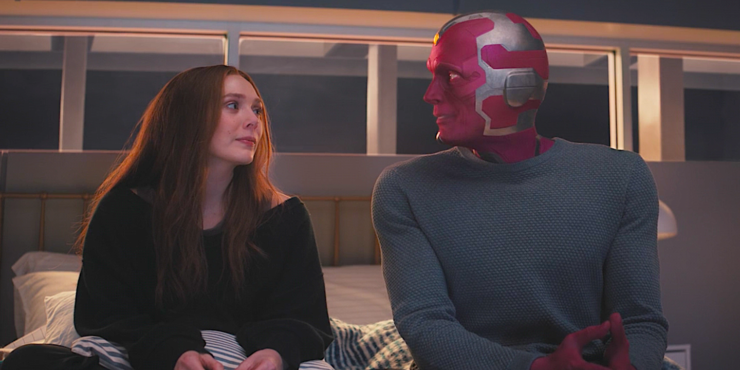Speculative fiction is uniquely equipped to tell stories about grief. With science fiction there’s a whole arsenal of clones, robots, and time travel that can allow mourners to confront their lost loved ones. In fantasy it’s easy to blur the lines between life and death and visit the dead. And obviously horror’s whole deal, from Frankenstein to ghost stories to zombie apocalypses, is about what happens when we confront death.
Thanks to WandaVision, I’ve been thinking about this a lot lately.
But before I talk about the three elements in WandaVision that I think are truly interesting, I’d like to revisit a few of my favorite SFFH works that tackle loss and grief.
***
In the second book of the Locked Tomb Trilogy, Harrow the Ninth, Tamsyn Muir moves away from the snarky third person that animated Gideon the Ninth and into a lacerating second person. Harrowhark Nonagesimus is talking to herself. And over the course of this twisty, complicated book, you start to understand why. Harrow is grappling with multiple losses, including, in many ways, the loss of her old self. Her only way through is to gather the scraps of herself she can recognize and recreate herself through the transformative process of Lyctorhood. Only then can she heal enough to confront her grief directly.
***
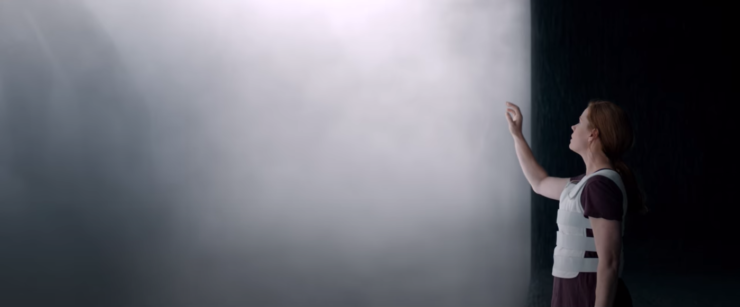
Arrival, based on the short story “Story of Your Life” by Ted Chiang, is an alien first contact story that’s actually about life choices and loss. Linguist Louise Banks is the first human who figures out how to speak to the Heptapods when they come to Earth, but learning their language and way of looking at time reshapes her own life in ways that echo through her romantic life and her life as a parent. It’s an intricate story that I don’t want to spoil for anyone who hasn’t seen it, but it’s also one of the most visceral depiction of grief I’ve ever seen in any film of any genre. And I can’t move on without saying: Amy Adams wuz robbed.
***
N.K. Jemisin’s The Fifth Season is an excellent example of how fantasy can explore grief. On a continent called The Stillness, people known as Orogones can control the earth beneath them. The ruling class hates and fears them, and tries to control their abilities by sending them for mandatory training with an organization called the Fulcrum. One follows Syenite, a young agent of the Fulcrum who’s sent on a mission to protect a port city that’s in danger of a powerful earthquake. One follows Damaya, a young girl whose powers as an Orogene have just manifested, as she’s sent to a school run by the Fulcrum. But the thread that speaks to me right now is that of Essun. An older woman who is hiding her powers as an Orogene in order to live a normal life. When her husband learns the truth he murders one of their children, and flees with the other. Essun sets out after him, determined to find him, exact her revenge for the death of their son, and save her daughter from being delivered to the Fulcrum. Because Jemisin is a goddamned genius, the action and suspense and mythology and worldbuilding are all amazing, but absolutely not the point. Every moment of Essun’s life is colored by the pain of her loss, and her decisions are made within the waking nightmare of putting one foot down after the other, knowing that each step takes you further from the time when your child was alive.
***
Zeyn Joukhadar’s The Thirty Names of Night is a delicate trans coming-of-age tale. Five years after his mother’s suspicious death, a closeted Syrian American trans boy begins to retrace elements of her life and confront his loss, while also trying to figure out why flocks of birds in numbers unheard of are suddenly swarming New York City, while he tries to find his place in the queer community, while he tries to find a new name that will allow him to be himself for the first time in his life. The fact that his mother’s ghost visits him every night doesn’t make things any easier. The book is lovely exploration of how grief shapes a person, and how community can help you heal. Also, a stirring reminder that if you’re able to attend a dance party, that will help.
***
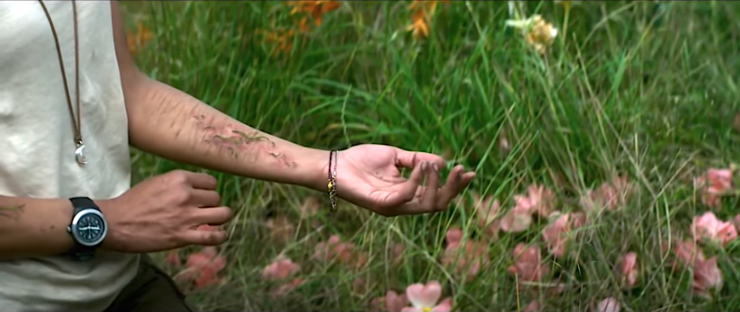
Jeff VanderMeer’s (exquisite) first novel in the Southern Reach Trilogy, Annihilation, is proper, grief-infused horror, and Alex Garland’s film adaptation focuses on the ways loss can change a person’s identity. The team of scientists who are sent in to explore “the Shimmer” are each in a different form of mourning. Protagonist Lena is only on the mission to learn what happened to her husband; she’s been living in a sort of liminal mourning since he disappeared into the Shimmer a year earlier. His return was a brief moment of relief, but she soon realized that the person who came back to her is not her husband. Over the course of the expedition the team wrestles with their own personal losses, and their coping mechanisms directly impact the fate of the missions. They also realize that (not unlike WandaVision’s Hex) their bodies are being rewritten by the Shimmer, in much the same way grief reshapes a person’s identity.
***
Lincoln in the Bardo is in many ways the culmination of George Saunders’ signature style, where the humor and the sadness are so tightly entwined that there’s no prying them apart anymore. The book’s conceit is that we’re following a group of souls in a Washington, DC cemetery as they try to stay in the Bardo—a realm between death and whatever comes after it. Why do they want to stay? Because they’re each clinging to a powerful memory from their lives. They spend their time reliving those moments over and over, grieving the lives they might have lived if only death hadn’t come when it did. This insular, self-obsessed grief is blasted open when Abraham Lincoln, mourning his youngest son, Willie, comes to the cemetery in the dead of night to hold the boy’s body one last time. The literary fantasy/ghost story/Buddhist musing makes grief its animating spirit, and it results in one of the best books of the decade.
***
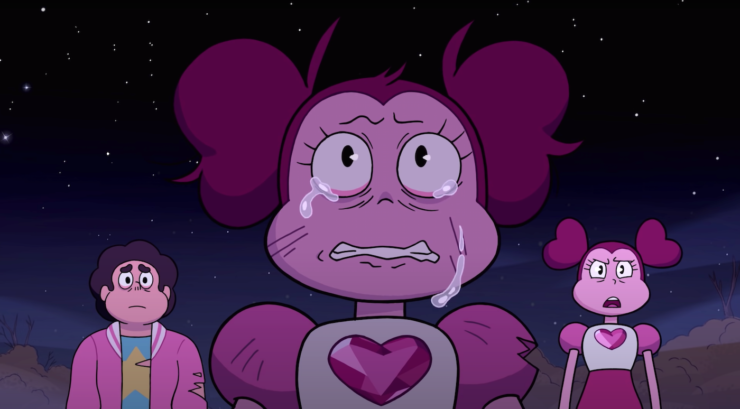
A lot of people were (quite fairly!) frustrated by the fact that after trapping the people of Westview in an endless psychic hell, Wanda feels terrible, but faces no real justice from the people she hurt. The writers instead give Monica the job of absolving her by saying “They’ll never know what you gave up for them” and then Wanda goes on her way. (I assume Stark Industries is going to foot the therapy bills, at least?)
If you want a story that’s a slow burn narrative about grief, terrible behavior, and consequences, might I interest you in Steven Universe? The show starts as a cute story about a little half-alien/half-human boy learning to use his magical powers, and it’s fun AF. But over the series Steven has to mourn not only his mother (she stopped existing to create him, kind of—it’s complicated) he also has to mourn his idea of her, as he learns that she could be an utter monster. His relationships with his fellow Crystal Gems shift constantly as all of them figure out how to live lives in her absence. Finally, Steven Universe: The Movie and follow up series Steven Universe Future are all about the aftermath of his mother’s greatest act of cruelty, and the damage some of Steven’s own decisions have caused. The movie and epilogue act as a reply and a corrective to the “empathy solves everything” narrative of the earlier seasons. The show owns up to the fact that some wounds won’t heal, and that Steven is going to have to grieve for his own past view of himself in order to become an adult.
***
There is no better way to process grief than in a ghost story—and Toni Morrison’s Beloved, on one level, is one of the best haunted house stories ever told. But the creepy horror elements are only a thin layer on top of a story that’s about a very different form of grief. What Beloved does is dig into bloody history of America and give voice to the grief of all the people who had their humanity stolen from them. It grieves for lives that began and ended in chains, at the same time that it gives us one story about one unique American family who have to create a future for themselves before their pasts can destroy them.
***
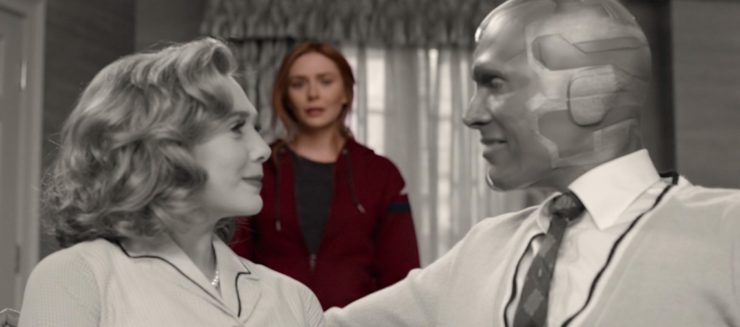
Which brings us back to why I think WandaVision, with all of its flaws and complications, is the perfect way to process this moment. I’m always interested in a commercial TV show or movie or book that chooses to give its audience something more than it needs to, and I think WandaVision has given us a few elements that transcend the rest of the show.
Rather than coasting on being a wonderful reimagining of sitcom tropes, or even a surprisingly un-creaky bridge to the Next Big Bit Of The MCU, the writers wove Wanda’s grief into the structure of the show. Wanda’s mourning for Vision is the catalyst for everything in Westview, and Monica’s grief over her mother’s death is what gives her the key to Wanda’s mind, and their shared understanding is what allows the show’s relatively peaceful resolution. The two of them are alone. While it seems like everyone around them is celebrating the reverse Snapture, reuniting with dusted loved ones, and getting miraculous second chances at life after a five-year Blip, Monica comes back to the knowledge that her mother is gone, a mediocre white man has taken the job that should have been hers, and her Aunt Carol has, seemingly, abandoned her human family. She is still trapped in the life she dusted out of. Wanda had to watch her partner die twice. She had to kill him to try to keep him out of Thanos’ hands, only to watch as Thanos reverse Time and ripped the Mind Stone out of his head. Then she herself is Dusted. But when she returns, it’s to find her partner’s body treated like a machine to be stripped for parts. Her sacrifices were for nothing. Killing Vision didn’t save humanity from the Snap, and it didn’t save Vision from the pain of being murdered by Thanos.
And now she has to live that knowledge, while watching all of the other Returned get on with their lives. Just as Monica has to live with the knowledge that she wasn’t with her mother when she died.
Buy the Book
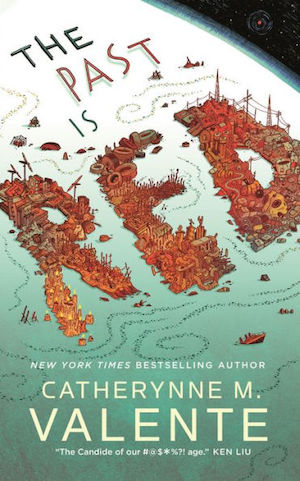

The Past Is Red
It’s an odd thing, to grieve something personal, “small”, while the rest of the world processes a hypertrauma. It’s like your brain has to find a way to hold the large grief, and its shadow, to learn when and how much you can look at each of them. It’s even worse when the hypertrauma begins to heal and you’re still left with your smaller mourning. We’ll have to process this, too, as vaccines spread, and the world returns to “normal” over the next year. Those of us who have lost people will still have to hold those losses. We’ll have to mourn in the midst of celebration.
We’re in a rare moment. Obviously, humanity’s devotion to wars, coups, terrorism, hate crimes, plain old vanilla murder, etc. etc. leads to death in terrible numbers, and every person who dies leaves a legacy of grief. Illnesses run rampant over the earth. The ongoing catastrophe of our climate is making life unlivable for more and more people. All of this is just the air we breathe. (I mean, it doesn’t have to be. We could change all of this and turn this Ship of Theseus around if we tried hard enough. But I’ll admit my optimism has been ground down to powder.) This moment, though, with the world held hostage by pandemic, feels quite different. Because of the convergence of political extremism that allowed the pandemic to get worse, which in turn led to a hope-restoring number of people worldwide participating in an uprising, almost every person on Earth has been grappling with grief at the same time. Whether you’ve lost family and friends to illness or to internet rabbitholes, whether you lost your heath to Long Covid, whether your relationships collapsed under the pressure of lockdown, whether you watched a video of a murder and were so horrified you took to the streets to demand justice—almost everyone on Earth is reeling from some level of grief. It might not be the unity we deserve, but it’s the one we got.
And that brings me back to the two moments the show brought us that I found truly unique. Yes, obviously, this is still a Marvel show, produced and distributed by the Mouse-Eared Monolith. This isn’t a Yates novel. This isn’t Chekov, or Marilynne Robinson, or Le Guin. The show still comes down to a big energy ball fight between a pair of witches who can fly.
But when Vision says to Wanda, “I’ve never experienced loss because I’ve never had a loved one to lose. What is grief, if not love persevering?” the writers are opening a door to a different kind of story. All the layers there—the grieving person being intruded upon, having to make room for someone who doesn’t or can’t understand, the way grief can only really be analyzed by someone completely outside of it, the way that analysis probably isn’t welcome in that moment, but creates a bridge to a different relationship with the two of them—it’s all really nicely done. And like everything now, the fact that the scene stood out immediately became fodder for memes and Twitter battles over whether the scene was actually good, or that last line was a ludicrous stab at profundity in the middle of a superhero show. Personally? I’m #TeamGriefLine. I think it’s a pretty good line, and exactly the kind of thing that would startle Wanda out of her haze of sadness. Plus, it’s believable coming from the mouth of a synthezoid (now that’s how you write a ludicrous sentence), and I think it was a bold move for the show to just, stop, and acknowledge the reality of a mourning person sitting numb in sweatpants in front of a TV.
And then, in the finale, Vision gives us the other mold-breaking moment. He short circuits the usual Big Boss Battle with a Star Trek-ian logic problem, which isn’t the mold-breaking bit, it’s that he doesn’t explain for the audience. Vision the Red and Vision the White start discussing the Ship of Theseus problem, and expect the viewers to keep up. And what this does, without explicitly saying it, is give us another window on grief. Because, yes, it may be love persisting, but it also rewrites the person who lives through it. Vision the White is a Ship whose boards and sails have now been built, torn apart, and replaced I think six times, now? But what is Wanda, if not also a Ship, who has been destroyed by the deaths of her parents, her brother, her partner (three times so far) and her children—and had to rebuild herself in a new way each time?
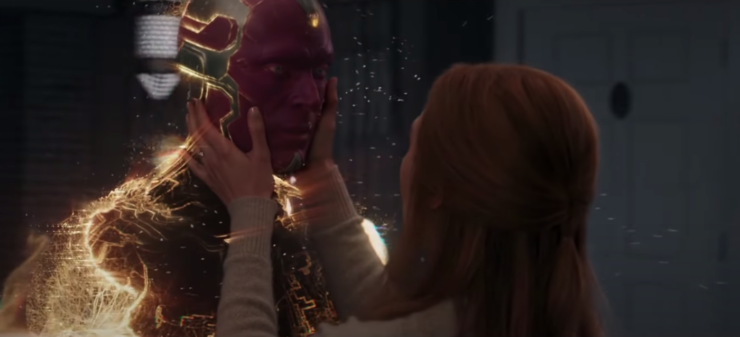
And yes I know THE DISCOURSE has centered on Wanda’s guilt, blame, lack of real justice. But I’m going to quietly suggest that somehow we’ve gotten exactly the right show for our time.
How shattering will our grief have to be to shout our love for everyone we’ve lost this year? How can we carry 2,590,000 people into the future with us?
None of us are what we were a year ago. How can any of us know, anymore, where the wood ends and the rot begins? How can we wear our chipped paint and torn sails?
Personally, Leah Schnelbach never shipped Theseus with anyone, and just wanted #JusticeforMinotaur—none of that shit was his fault! Come persist with them on Twitter?










